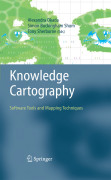
Knowledge cartography: software tools and mapping techniques
Okada, A.
Buckingham Shum, S.J.
Sherborne, T.
Knowledge maps are ideal tools for capturing, organizing and extracting meaning from many different sources. They provide powerful graphic tools for classifying, representing and communicating all kinds of information. This book discusses significant new research and explains its underlying principles in termsof Knowledge Cartography. It offers a rich variety of conceptual frameworks, mapping techniques and case studies. Readers are shown how to apply knowledge maps in different teaching, learning and knowledge management contexts. Discussions include: What theories help us to understand knowledge maps in learning?What are the best methodologies and techniques for creating knowledge maps? What best practices exist in the use of mapping for learning? What are the difficulties and challenges of using knowledge cartography in learning?. Offers a broad range of knowledge mapping techniques and software tools applied to advanced information and knowledge processing Presents an extensive collection of examples and study cases in knowledge cartography Contributions from a widespread variety of leading mapping practitioners Accompanying website contains a forum to discuss the content, mediated by the authors, and knowledge maps with hyperlinks INDICE: From the contents Empirical Studies of the Value of Conceptually Explicit Notations in Collaborative Learning.- Concept Mapping using CMapTools to Enhance Meaningful Learning.- Enhancing Collaborative and Meaningful Language Learning through Concept Mapping.- Thinking Maps: A Visual Language for Learning.- The Constructivist Mapping of Internet Information at Work with Nestor.- Cognitive and Pedagogical Benefits of Argument Mapping.- Scaffolding SchoolPupils Scientific Argumentation with Evidence-based Dialogue Maps.- Argument Diagramming: The Araucaria Project.- Mapping the Curriculum: How Concept Maps can Improve the Effectiveness of Course Development.- Using Compendium as a Tool to Support the Design of Learning Activities.- Performing Knowledge Art: Understanding Collaborative Cartography.- Knowledge Cartography for Controversies: The Iraq Debate.- Computer Supported Agreement Visualisation.- Human-Agent Knowledge Cartography for e-science: NASA Field Trials at the Mars Desert Research Station.
- ISBN: 978-1-84800-148-0
- Editorial: Springer
- Encuadernacion: Cartoné
- Páginas: 445
- Fecha Publicación: 01/06/2008
- Nº Volúmenes: 1
- Idioma: Inglés
